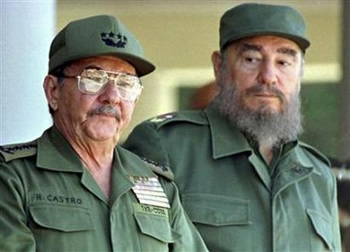The political system is organized within a framework of an independent socialist republic. Cuba is constitutionally defined as a "socialist state guided by the principles of José Martí, and the political ideas of Marx, Engels and Lenin." The present Constitution also ascribes the role of the Communist Party of Cuba to be the "leading force of society and of the state."

According to data from American organization Freedom House, Cuba is the only "non-electoral democracy” of the Americas.
Executive power is exercised by the Government, which is represented by the Council of State and the Council of Ministers. Legislative power is exercised through the unicameral National Assembly of People's Power, which is constituted as the maximum authority of the state.
Currently Raúl Castro — brother of former President Fidel Castro — is President of the Council of State, President of the Council of Ministers (sometimes referred to as the Prime Minister), First Secretary of the Communist Party, and Commander-in-Chief of the Revolutionary Armed Forces.
There are no legally recognized political parties aside from the Communist Partywhich controls everything. The government, moreover, still controls well over 80 percent of the economy.
The constitution guarantees individual freedoms and freedom of speech, religion and press provided they are in tune with the goals of a socialist society. This really puts the concern for human rights on a back burner. Political dissent is not tolerated.
Political changes are bound to come slow. The Cuban government runs virtually every aspect of the country. They have complete control of the government all business. Invariably, those in power may look for any excuse to not losen their grip on one-party communist rule over the island. Many Cuba experts believe this has lead to Castro putting the framework in place for a possible successor in the hopes of avoiding any political chaos. That is what Raul has been working toward for the last five years since he officially became president. He has been working very carefully, on setting the stage for the next generation of Castro followers to take power. Some say the communist regime is growing politically confident in its ability to hold power.
Most Cubans call the revolutionary government el sistema. Understanding the inner workings of el sistema explains how Raúl Castro and Barack Obama's recent decision to renew diplomatic relations may not change Cuba in ways politically or economically beneficial to the majority of citizens.




